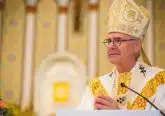US bishops vote to keep time limits on discussion of Eucharistic document
by Matt Hadro
Washington D.C., Jun 16, 2021 / 14:57 pm
While some U.S. bishops on Wednesday pushed for no time limits in debating a motion to draft a teaching document on the Eucharist, during their meeting this week, a majority opposed that push, allowing for a vote to proceed under the normal limits of debate.
As the bishops began their annual spring meeting on Wednesday afternoon – held virtually this year due to the pandemic – they voted in a parliamentary move to approve their meeting agenda. Included in the meeting’s agenda for Thursday is a vote on whether to begin drafting a teaching document on the Eucharist.
Before the vote on the document on Thursday afternoon, there will be a period of debate governed by rules and time limits as part of the conference’s parliamentary procedures. Archbishop Mitchell Rozanski of St. Louis, however, moved to change the agenda to allow for unlimited debate.
At the end of the discussion, 59% of bishops voted against Archbishop Rozanski’s motion. The bishops then voted to approve the meeting agenda, which 86% of those present moved to do.
Rozanski said that due to the virtual nature of the assembly, there should be no time limits on debate among the bishops. “We owe this to our people,” he said. Cardinal Joseph Tobin of Newark seconded the motion.
The topic of Communion has been a topic of extensive discussion recently, with individual bishops speaking out on worthiness to receive Communion, especially with regard to Catholic politicians who support permissive legislation on grave evils such as abortion and euthanasia.
The prefect of the Vatican’s Congregation for the Doctrine of the Faith, Cardinal Luis Ladaria, wrote to Archbishop Jose Gomez – the president of the U.S. bishops’ conference – on May 7, instructing that if the bishops were to issue any “national policy” on Communion, they would first need “extensive and serene” dialogue among themselves.
Some bishops, citing Ladaria’s call, wrote to Archbishop Gomez in May, asking for a delay in consideration of the Eucharistic document until the bishops can again meet in-person. Gomez, in turn, responded in a May 22 memo to all bishops that the discussion would take place as planned.
Bishops on Wednesday cited Ladaria’s words in calling for no time limits in the discussion on Eucharistic consistency.
Bishop John Stowe of Lexington emphasized the need to “discuss, and take our time” about such a document on the Eucharist. “It seems that some of the brother bishops want to rush this discussion,” he said, advocating the need to “take our time with something that is so important and so delicate.”
Bishop Shawn McKnight of Jefferson City expressed concern about the “yoking of too many important decisions” in one Eucharistic document, without the discussion that needs to take place.
Every bishop who wants to speak should be given the opportunity, he said. “I do not think that Ladaria’s letter” is about asking conference committees to talk to each other, he said, adding that individual bishops must be able to debate among themselves on the document.
Archbishop John Wester of Santa Fe said that the two issues of the “beauty” of the Eucharist and who may receive Communion should be discussed separately.
Cardinal Blase Cupich of Chicago expressed concern about a proposed outline of the document, saying that it is “very clear, however, that the language within the draft does cause concern.” He called for a “full discussion” without time limits.
Proper discussion among the bishops “has not taken place,” he said, and discussion with Catholic politicians who support policies contrary to Church teaching has not taken place, either.
“And we should also have a discussion with Catholic politicians who have positions that are in conflict with the teachings of the Church to find out why they have those positions. That, too, has not taken place,” he said, arguing for no time limits on the discussion of the proposed Eucharistic document.
In 2019, Cupich told CNA he had ongoing “conversations” with Catholic leaders in the Illinois state legislature who championed an abortion coverage mandate. He told CNA that he thought it would be “counterproductive” to deny Holy Communion in his archdiocese to the legislators who championed the law.













